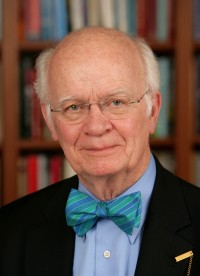Cantus firmus: A melody that is firm and clear
To Dietrich Bonhoeffer
Executed by the Nazis in April 1945
Your faith I find impossible to emulate
In the true God whose eye
Is on the sparrow, and also me, but
Perhaps I may be permitted
To learn something of your very human grace,
Your fortitude (unfashionable word),
And live faithfully, ceasing to whine about
Every dirty toss and deal of the cards,
But move along a cantus firmus of my own and
Embrace the rich “polyphony of life.”
Mark Perlberg, The Burning Field
(Morrow, 1970)
I reencountered this short poem recently as I was preparing for the Tenth International Bonhoeffer Congress in Prague. In the process, I came across this poem written by my friend Mark Perlberg almost 40 years ago, and it repossessed me. In Letters and Papers from Prison, Bonhoeffer writes, “There is always the danger in all strong, erotic love that one may love what I might call the polyphony of life. What I mean is that God wants us to love him eternally with our whole hearts—not in such a way as to injure or weaken our earthly love, but to provide a kind of cantus firmus to which the other melodies of life provide the counterpoint. Only a polyphony of this kind can give life a wholeness and at the same time assure us that nothing calamitous can happen as long as the cantus firmus is kept going.”
While still in the mulling season after I had reread the poem, I saw Perlberg’s obituary in the Chicago Sun-Times (June 25). “Co-founded Poetry Center: Wanted to bring readings off college campuses and open them to the public.” I called his wife, Anna, at once and learned in a bit of detail that he died from a virus connected with cancer. That was the final “dirty toss and deal of the cards,” which would have tempted a lesser humanist than he to whine.
If you are not a poetry-minded Chicagoan, you may not have heard of Perlberg, though, while writing poetry, he helped advance the careers and publication of many in that neglected company of noncelebrities, our poets. Among the poets and writers he heralded were Brodsky, Brooks, Ginsberg, Ferlinghetti, Keillor, Milosz, Updike, Bellow, Cheever and Terkel—a Who’s Who of 20th-century American letters. I met him in the 1960s, when he wrote about religion for Time magazine, and I followed his career while he edited at Britannica and World Book. He did poetry downtown and I did prose at the University of Chicago, so our paths diverged somewhat, though he and I would occasionally lunch when I came to the Christian Century offices.
He was my poetry tutor, who introduced me to Theodore Roethke, Richard Wilbur and many more. One day we got to talking about Bonhoeffer and discussed the concept of the cantus firmus, which later found its way into the quoted poem. I’ve tried to build my life around the metaphor: a cantus firmus is a melody that has to be firm and clear, well crafted and defined, so that contrapuntal parts can be added to it. I commend it to others. Try it on for size and pass on Bonhoeffer’s words to honor Mark and to greet Anna and all who would find fortitude and cease whining, who embrace Eros and who are not afraid to “move along.”
Poem used by permission of Anna Perlberg.





